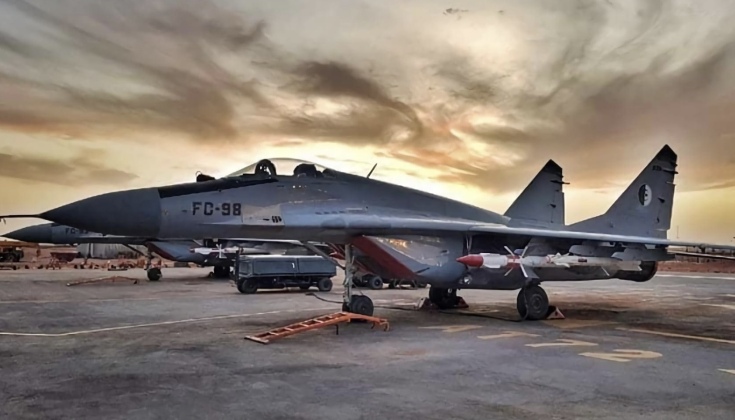Reports
Algeria Paves the Way for Acquiring Sukhoi Aircraft by Donating MiGs to Sudan

Source: bulgarianmilitary
A defense site recently reported that the Russian MiG-29 aircraft, currently owned by the Algerian Air Force, may soon enhance the capabilities of the Sudanese Air Force. This potential move aligns with Algeria’s plans to modernize its own fleet, which includes the expected delivery of Su-57 aircraft and the 70 current Su-30 fighter jets.
The site mentioned that “the African defense landscape is poised for significant changes, indicating that the Algerian Ministry of Defense may soon provide a surplus of Russian-imported MiG-29 fighter jets to the Sudanese Air Force.” Interestingly, these MiG-29 aircraft are a cornerstone of Algeria’s current fighter capabilities. The Algerian Air Force is reportedly preparing for further modernization with plans to purchase fifth-generation Su-57 fighter jets from Russia later this decade.
Although this development isn’t entirely new, recent discussions between Algerian and Sudanese sources reignited talks about the potential deal over the past 72 hours. This news, though still unofficial, comes after a turbulent half-decade in Sudan, marked by the 2019 coup that ousted President Omar al-Bashir.
Rumors about the possible donation of Algeria’s surplus MiG-29 fighters point to a strategic move to strengthen ties between the two countries. Previously, Algeria has shown a willingness to provide military aid to the region, emphasizing its growing role in Africa.
Military experts like Alexander Goltz highlight that the Su-57 would offer Algeria significant advantages in aerial operations, enhancing its position as a dominant power in North Africa. This shift may concern neighboring countries like Morocco and Tunisia, potentially prompting them to bolster their military resources in response.
For Sudan, acquiring the MiG-29 would strengthen the national armed forces’ ability to maintain airspace control, especially amid internal conflicts and rebel threats. While the MiG-29 is an older model compared to contemporary fighters like the Su-57, it remains a powerful asset for securing air superiority. This could bolster the Sudanese army’s position against the Rapid Support Forces (RSF).
Geopolitically, the Algerian-Sudanese partnership, backed by Iran, could introduce new power dynamics in the region. This might prompt reactions from traditional Western allies and countries like Saudi Arabia and the UAE, which have vested interests in Sudan. Political scientist Hani Nasr noted that such military alliances could form new regional blocs and complicate Western diplomatic efforts.
Meanwhile, the Sudanese public may respond differently, with some factions welcoming foreign assistance while others express concern about increased reliance on foreign powers and the potential strengthening of military rule.
The economic implications of these deals are significant for both Algeria and Sudan. For Algeria, purchasing the Su-57 is a substantial investment. Despite having abundant natural resources like oil and natural gas, funding such a deal could strain the national budget, especially considering the need for maintenance, training, and infrastructure.
Military analysts estimate the cost of a Su-57 at over $100 million, and Algeria plans to acquire up to 14 aircraft. Such large expenditures could have long-term economic impacts, possibly forcing Algeria to make budget cuts in other areas to fund military projects.
In Sudan, the economic effects are multifaceted. Although the MiG-29 aircraft are being donated by Algeria, maintaining and upgrading these relatively older planes will require funding. These costs could further strain Sudan’s economy, already burdened by ongoing internal conflicts and political instability, potentially fueling social discontent.



